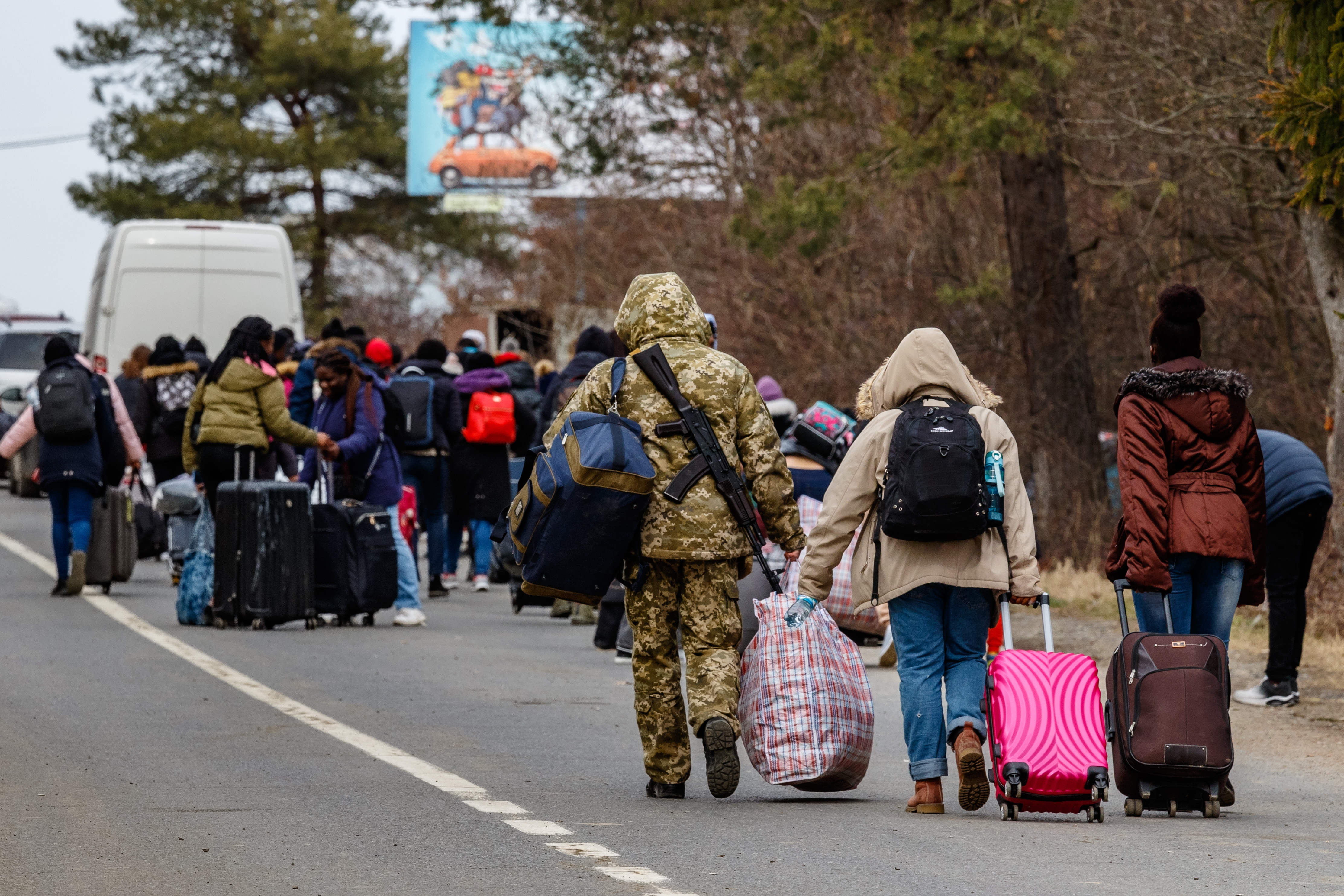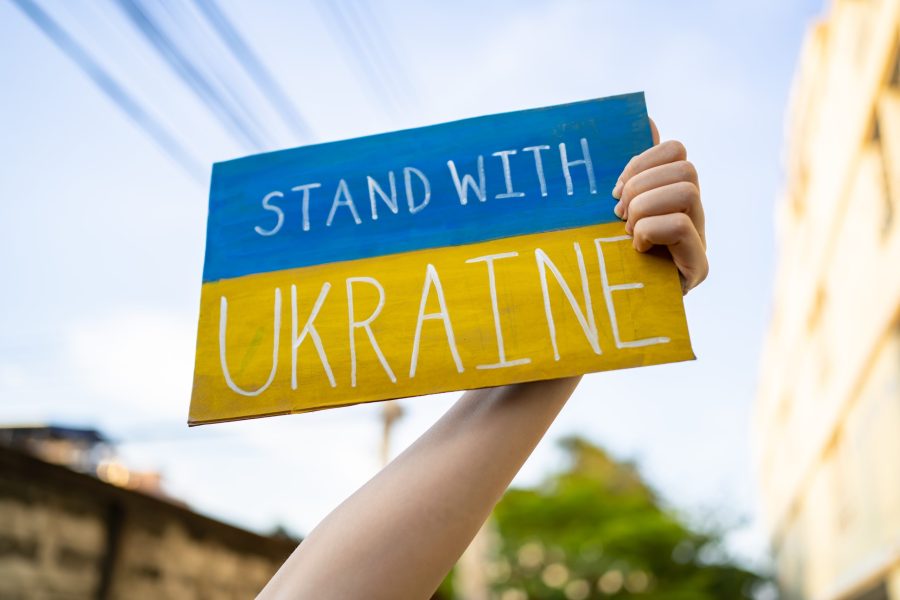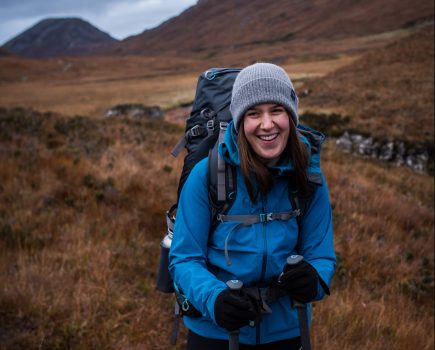As shockwaves from Russia’s invasion of Ukraine ripple across the globe, here’s what the outdoor world is doing to help the country and its people – and how you can too.
At the time of writing, the war in Ukraine has driven more than 10 million people from their homes, creating what the UN Refugee Agency describes as “the fastest growing refugee crisis since World War II.” Millions more are living in cities heavily besieged by Russian troops.
Governments, businesses and individuals across the world have been taking action on an almost unprecedented scale to isolate Russia and offer support to Ukrainian refugees. So how has the outdoor community reacted to the escalating crisis?
Brands in action
On March 2nd, less than a week after the war began, the European Outdoor Group (EOG) issued a rallying statement. “As an outdoor industry association, we may not have the ability to influence military actions, but we can mobilise our members and the wider sector to aid the innocent civilians who are being affected by those actions,” it said. “Our industry specialises in the design, manufacture, and production of kit that can help people in the harshest conditions, and we can step up now to provide assistance. This is not a marketing opportunity, it’s a call to action.”
Dozens of outdoor brands have responded to the appeal. KEEN began working with local distributors in Poland and the Czech Republic shortly after the crisis began, supplying refugees with footwear and other essentials. The Outdoor Industries Association has teamed up with the Polish Outdoor Group to gather and distribute donations – it started sending lorries loaded with outdoor equipment to Ukraine in mid-March. Exxel Outdoors, the parent group of Sierra Designs, sent 2,500 sleeping bags directly to Ukraine, while DMM, Alpkit, Fjällräven and Ellis Brigham have been coordinating donations of second-hand gear.

Ukrainian refugees being helped by soldiers near the Slovakian border. Photo: Shutterstock
Some brands – including KEEN, Haglofs, Helly Hansen and Patagonia have also donated directly to crisis appeals. “This war has no place in an equitable world – especially one in the grip of emergencies in energy and climate,” said Patagonia’s statement on Ukraine. “The people of Ukraine need our help now.”
Cutting ties
Alongside efforts to help refugees, some outdoor brands have signalled their condemnation of the invasion by cutting ties with Russia. Helly Hansen has suspended all its operations in the country, as has The North Face, Canada Goose and Exxel Outdoors. And it isn’t just global corporations piling on the economic pressure. Ultralight Outdoor Gear, a Hartlepool-based firm with just 21 employees, has also ceased trading with Russian clients. Founder Mark Richardson said that he “felt it was the right thing to do” despite Russia representing one of the company’s bigger international markets.
In common with many other sporting organisations, the British Mountaineering Council (BMC) and Mountaineering Scotland (MS) have also taken steps to isolate Russia and Belarus. The BMC has announced its intention not to host any competition or activity within the two countries, nor to compete in events where Russian and Belarusian athletes are allowed to represent their countries.
In a statement, the organisation said: “The BMC is an apolitical organisation and believes that sport and politics should remain separate. We strongly believe that the athletes and civilians of a country should not be punished for the decisions made by their governments. However, Russia’s unprovoked attack on Ukraine, an act that is a clear violation of international law and the UN Charter, places us in a difficult situation.
“We, along with other sports federations across the UK, condemn the actions of Russia in invading Ukraine, and we condemn the support that they have received from Belarus. We do not believe that we can sit by and watch this atrocity unfold without doing all that we can to support the international efforts to secure a rapid and peaceful withdrawal of Russian troops and a return to peace in the region.”
The measures taken by the BMC have been endorsed by Mountaineering Scotland. MS President Brian Shackleton said that the two organisations “share the general view that politics and sport should remain separate.” However, he added: “In view of the dreadful reports and images coming from Ukraine as a direct consequence of the military invasion by Russia, we both consider it is the right thing to do to condemn the actions taken by the Russian government.”
No peace, no climb?
International outdoors organisations have taken similar steps. The International Climbing and Mountaineering Federation (UIAA) has cancelled two Ice Climbing World Cup events in Russia and excluded Russian athletes from all UIAA-sanctioned events. President Peter Muir said that the organisation: “deplores in the strongest possible terms any and all use of state or individual violence in pursuit of any aim or for the purpose of the settlement of perceived or actual disputes such as the current Russian actions against Ukraine.”
Ukrainian mountaineer Irina Galay has also called on the international mountaineering community to ban Russians from climbing the world’s highest mountains. The first Ukrainian woman to summit both Everest and K2, Galay enlisted in the territorial defence forces shortly after the Russian invasion. “I hope Russians won’t be permitted to approach any single mountain this year,” she said, in an interview with Outside. “I hope they won’t be allowed to raise the flag of their country on any mountain in the world.”
View this post on Instagram
Galay and her partner Yuri have launched a social media campaign page called ‘NO PEACE, NO CLIMB’. On it, she argues that Russians should be banned from international climbing expeditions for as long as the invasion of Ukraine continues. “If you are a Russian citizen not agreeing with this war then cancel your expedition and find a way to help or protest,” she adds. “Hoping, ignoring, or being silent is not the way to stop this war, now is the time to make the choice.”
But Russian mountaineers and climbers are already flocking to the anti-war movement. Thousands have signed an open letter calling for an end to military action in Ukraine. The letter dubs the act of invasion “a crime” and acknowledges that Ukrainians are “our friends, side by side with whom we have passed the most terrible trials and shared difficulties in the mountains.” Signatories take a major risk – they face a potential 20-year jail sentence for speaking out. “We understand that our letter will not change Putin’s mind,” said one of the promoters, “but at least we want people in other countries to know that we are against this war.”
Solidarity across borders
Other Russian mountaineers have gone further. In March, Russian mountain guide Vladimir Kotlyar was forced to move to Kathmandu after unfurling a banner reading ‘STOP WAR IN UKRAINE’ on Kilimanjaro. Such acts of solidarity call into question the morality of punishing Russian mountaineers and climbers for the actions of their leader. As the humanitarian crisis grows, international ties of friendships forged in the mountains have never been more important.
View this post on Instagram
One Ukrainian demonstrating the important of those friendships is Slovakia-based Illya Bakhmet-Smolensky. 17-year-old Bakhmet-Smolensky, who became the youngest person in the world to climb a 9a in 2013, has been using his ties in the climbing community to connect refugees with hosts. “Many European climbers know me and have already texted to me about providing help with housing,” he wrote in an Instagram post. “Since I’m currently at home in complete safety, I’m ready to match you with the locals! Therefore, if there’s anyone in need – please text me!”
Even within Ukraine, outdoors and mountain communities have rallied to support refugees fleeing bombarded cities. Guide Oleg Ivanchenko is among those offering his help – he’s turned the basement of his alpine club in Odessa into a shelter. And the Ukrainian mountains themselves are offering sanctuary to those displaced by the bombing. The Carpathians, which once sheltered Jews fleeing pogroms and victims of Stalin’s Red Army, are now witnessing an influx of refugees from Kyiv and elsewhere. While the mountains can offer them temporary protection, however, they still face the same question as millions of other Ukrainian refugees dispersed across Europe: when can they return home?
Three ways you can help the people of Ukraine
1. Donate to charities aiding refugees: These include the British Red Cross (www.redcross.org.uk), #HelpUkraine Emergency Appeal (www.gofundme.com/f/helpukraine), Unicef (www.unicef.org/) and Save the Children (www.savethechildren.org.uk).
2. Host a Ukrainian refugee: The government’s Homes for Ukraine scheme allows both individuals and organisations to offer shelter to displaced Ukrainians. Visit https://homesforukraine.campaign.gov.uk to find out more. If you’re in a position to offer a job to a Ukrainian refugee, you can advertise it via www.jobaidukraine.com.
3. Raise your voice: Join a peace protest (https://standwithukraine.live/peace-protests), use your social media presence to campaign for peace (www.globalcitizen.org/en/action/we-demand-peace-now) or urge UK pensions funds to stop investing in Russia (https://www.globalcitizen.org/en/action/pensions-companies-dont-fund-war/) – there are plenty of ways to take action in support of Ukraine.
PLUS: Don’t forget the victims of other conflicts
Russia’s invasion of Ukraine has dominated headlines, but there are others who have suffered in recent conflicts. The Disasters Emergency Committee’s Afghanistan Crisis Appeal, which aims to mitigate a situation described by the World Food Programme as “the worst humanitarian crisis on Earth”. In Yemen, UNICEF is running a fundraising appeal to help what it estimates are 11.3 million children are in need of humanitarian assistance,







